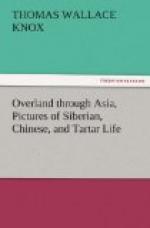The lottery has a place in the Chinese courts of justice. There is one mode of capital punishment in which a dozen or twenty knives are placed in a covered basket, and each knife is marked for a particular part of the body. The executioner puts his hand under the cover and draws at random. If the knife is for the toes, they are cut off one after another; if for the feet, they are severed, and so on until a knife for the heart or neck is reached. Usually the friends of the victim bribe the executioner to draw early in the game a knife whose wound will be fatal, and he generally does as he agrees. The bystanders amuse themselves by betting as to how long the culprit will stand it. Facetious dogs, those Chinese.
To enumerate all the ways of inflicting punishment in China would be to fill a volume. Punishment is one of the fine arts, and a man who can skin another elegantly is entitled to rank as an artist. The bastinado and floggings are common, and then they have huge shears, like those used in tin shops, for snipping off feet and arms, very much as a gardener would cut off the stem of a rose.
Some years ago the environs of Tientsin were infested by bands of robbers who were suspected of living in villages a few miles away. The governor was ordered by the imperial authority to suppress these robberies, and in order to get the right persons he sent out his soldiers and arrested everybody, old and young, in the suspected villages. Of course there were innocent persons among the captives, but that made no difference; some of them were blind, and others crippled, but the police had orders to bring in everybody. The prisoners were summarily tried; some of them had their heads cut off, others were imprisoned, and others were whipped. Nobody escaped without some punishment; the result was that the robber bands were broken up and the robberies ceased.
[Illustration: A CHINESE PALANQUIN.]
[Illustration: A PEKIN CAB.]
It is not easy to go about Pekin. It is a city of magnificent distances, and the sights which one wants to see are far apart. The streets are bad, being dusty in dry weather and muddy when it rains, and the carriage way is cut up with deep ruts that make riding very uncomfortable. The cabs of Pekin are little carts, just large enough for two persons of medium size. They are without springs, and not very neatly arranged inside. If one does not like them he can walk or take a palanquin—there are plenty of palanquins in the city, and they do not cost an exorbitant sum. They are not very commodious, but infinitely preferable to the carts. The comforts of travel are very few in China. A Chinese never travels for pleasure, and he does not understand the spirit that leads tourists from one end of the world to the other in search of adventure. When he has nothing to do he sits down, smokes his pipe, and thinks about his ancestors. He never rides, walks, dances, or takes the least exercise for pleasure alone. It is business and nothing else that controls his movements.




